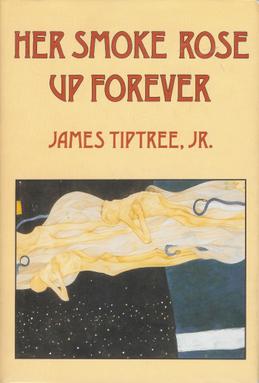Alice Bradley Sheldon was born in 1915 in Chicago, Illinois into a wealthy family. Her father was successful in real estate and her mother was a well-known writer, hunter, and explorer. It was because of her mother that their family went to the Congo when she was only six years old. During this trip Alice saw elephants hunted and eaten and slept in a cot over the carcasses of the game they shot. Her mother even “jokingly offered her blonde daughter in trade for a chief’s ivory bracelet” right in front of her (Hand 42). Despite her admiration for her mother’s spirit and success as a writer, her experiences in the Congo heavily affected her throughout her life and made her question what a woman was supposed to behave like. When she was nine years old she returned with her family and was for some villagers the first Caucasian person they had ever seen. She was not allowed a gun because it was improper for women to bear arms.
At eighteen Alice impulsively married and spent six years in a dysfunctional marriage. After that marriage dissolved she enlisted in the Women’s Army Auxiliary Corps (WAAPC). May 1945 she was transferred to Europe where she met Colonel Huntington, “Ting” Sheldon. Alice “challenged Colonel Sheldon to a game of chess played blindfolded, and won. He fell in love” (Sturgis 1).
For many years Alice had tried unsuccessfully to be a painter and writer. She wrote feminist protests under the pseudonym Mrs. Huntington D. Sheldon. She wanted to be a successful science fiction writer but the genre was male dominated and she knew her work would not be looked at in the same light. While at the supermarket she saw a jar of Tiptree Jam and with her husband’s addition of Jr. James Tiptree Jr. was born. She wanted a name that editors would not remember rejecting. What she didn’t expect was that by the end of 1967 she would have sold three stories. Her mother presented Alice with an impossible standard. That combined with her experiences in the Congo made her feel inadequate as a female writer. Tiptree wrote in a way that expressed everything she couldn't.
James Tiptree Jr. wrote stories “about women's alienation in a world of men, and was held up as an example of a male feminist, a man who understood” (Phillips). Even being sympathetic towards women he was considered to be so manly that there was no doubt that he was a man and not in fact a sixty year old woman. Tiptree’s most famous work is “The Men Women Don’t See”. Other works include “All the Kinds of Yes” and “A Momentary Taste of Being”.



Despite having been married to two men in her life, Alice struggled with her sexuality. She had tried unsuccessfully to engage in sexual relationships with women. Through her creation of Tiptree she was allowed to engage in flirtation through her letter correspondents with women. She suffered from a lack of identity and gave her an outlet to be entirely free in her writing and express her affinity for women.
Like any story she had written, Alice had a say in how her life ended. Her and her husband made a pact that when they became too old they would end their lives together. In 1987 Alice shot her husband and then herself. They were found holding hands in their bed. After her death, in 1991 the James Tiptree Jr. Memorial Award was created to expand the ideas people have about gender in literature.
Works Cited
"Go Ask
Alice." Fantasy & Science Fiction 111.4/5 (2006): 40-50. Academic
Search Premier. Web.
7 Dec.2015.
Phillips, Julie. "The Secret Sci-Fi Life of Alice B.Sheldon." Npr.
N.p., 15 July 2011. Web. 07 Dec.
2015.
Sturgis, Susanna
J. "The Man Who Didn't Exist. (Cover Story)." Women's Review Of
Books 23.6
(2006): 34. Academic Search Premier. Web. 7 Dec. 2015.
Farrah,
ReplyDeleteI found everything in your profile about Sheldon to be fascinating. I think it's wonderful that she was so passionate about writing science fiction that she wrote under a pseudonym just so that she could have her works published. I love that even under the disguise as a male, she still wrote feminist works to try to bring to light the problems women face with not being taken seriously. Other than discovering that she wrote under a pseudonym, what was the most fascinating thing you learned while researching your author?
Skyler S. Conley
What a fascinating life she led! I think her last pact with her husband is super admirable as well as sort of scary and its impressive that she was the one to carry out the deed. Her back story makes me want to read her literature to see the influences behind the work.
ReplyDelete-Deanna Hance